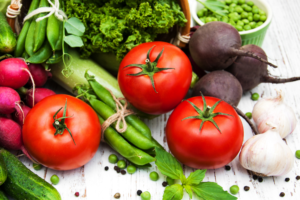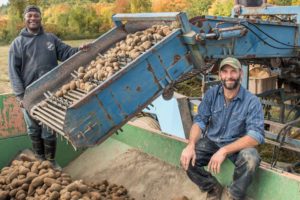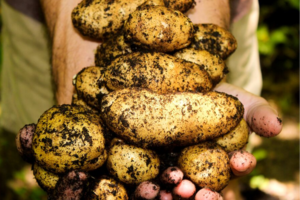
The folks at Three River Farmers Alliance (Andre Cantelmo is second from the right)
Three River Farmers Alliance is a farm collective serving the NH Seacoast region. They began in 2015 when Andre Cantelmo and Greg Balog of Heron Pond Farm realized that entering the wholesale market would require a lot of smaller farms to work together. We got to speak to Andre about a wide range of issues; what it’s like as a small farm entering the market, online sales, the impact of COVID-19, and more.
LFM: Hi Andre! Thank you so much for agreeing to be interviewed today. For those of us that are unfamiliar with Three River Farmers Alliance and what you do, could you give me a little background?
Andre: I own Heron Pond Farm; we’re your traditional, jack-of-all-trades small farm. We farm about 60 acres of mixed produce, as well as a CSA, a farm stand, farmers’ markets and some wholesale.
Back in 2013, we looked at the shifting marketplace, the waxing and waning of the CSA/farmers markets, and we thought “How do we get more local food out there?” The wholesale model and all its logistics looked pretty rough: we’d drive up and see this stream of other farm trucks going to the same exact places. I knew we wanted to work together rather than compete.
So, we approached two other farms that had a small wholesale presence and said, “Listen, we want to enter the wholesale market. We think there’s an opportunity for a collective approach: we share our distribution and other costs.” And that’s the beginning of Three River Farmers Alliance right there!
LFM: Is that where LFM got into the mix?
Andre: We made lists of everything we needed make it more efficient – and online ordering was first and foremost. We searched through simple online ordering platforms, and there were a lot of other programs where you could just throw something on the net and sell it. But there was no room to expand. And their payment structures tend to end up with you working for them.
At the time, Local Food Marketplace looked like an aircraft carrier. We thought we would never use all of it. But then again, we were early adopters and we went in at an entry level. And LFM really had it figured out. It was really priced right.
But we’ve grown with it. We’ve added modules and all kinds of things to grow our wholesale and it’s really dropped the cost of distributing our wholesale product. Our partners and other producers see what we do with LFM, and the benefits we get – then they really want it, too.
LFM: For the folks just starting out, looking at all the online ordering options out there – what would you advise?
Andre: I get a lot of calls from other aggregators saying, “what software are you using, and how is it useful?” [I tell them] that LFM has many different strengths, and first is the response of the LFM team.
When everything [with COVID-19] went down, we were thinking, “how are we gonna do all this routing?” Because routing used to be easy – it used to be a couple stops, only wholesale. But now we have 900 stops! How the heck do you put that together? We reached out to LFM, and in two weeks, LFM created a way for us to create our routes, download our orders into a program (it’s Routific ) and then it uploads back into LFM and prints out the invoices in the right order and groups them by route. It’s pretty cool [to get this feature] when it didn’t even exist two weeks ago! Working with a company like LFM – a company that’s willing to respond like that – I mean, that’s a lot easier than calling up somebody that just really wants you to buy some package and do it their way.
A lot of the people that pivoted early [were able to do it] because the LFM software was so flexible. We talked to a couple other food hubs [that aren’t using LFM] and they said, “We can’t move that fast. We just don’t have the adaptability. We just can’t get it going that quickly.”
I probably bother Amy more lately than I have in years – I mean, I just email her when another thought comes up, like “hey, can the software do this?” And LFM is always responding. Like today, I got an email from LFM telling me they were already working on some idea I had just thrown out there. Basically, we were actually paying somebody to go through and highlight each packing slip to call out stuff like frozen food or eggs. And two days ago, I emailed LFM saying “hey, it would be pretty cool if you could highlight different groups of stuff and you could print it that way.” I thought that was the most obscure thing… and then I get an email back like “yeah, we’re working on that!” LFM is great. Honestly, I don’t know when you guys sleep.
LFM: How has using LFM impacted your costs?
Andre: It just builds a bigger network for us – and that’s our basic philosophy: the more food that’s on the truck the lower the cost is for everyone. And that impacts the cost of everything, from billing down to the aggregate cost of running the trucks or the coolers. I’ve been surprised where our costs really are now.
LFM: What was your process like without LFM?
Andre: We used to do things totally backwards when we weren’t using the system. We’d calculate all the costs and deduct it from all our producers, instead of doing a markup. Which of course, is what every other institution is doing. We moved to a markup system and gosh darn I am glad that we did. We completely pivoted our business system a couple weeks ago. LFM is designed to accommodate changes like that – for example, LFM does all of the calculations for you, including payment. Then, week by week, day by day, you can now understand where your margins are fluctuating, and how much something is costing you to do in real time. And that’s not an available feature with a lot of other platforms.
LFM: What has the process been like with your producers?
Andre: Depending on the time of year, we have between 40 and 60 producers. We work with them a couple different ways. [Our Three River Alliance producers manage their own] Producer Profile, which is the standard model.
But for producers just wanting to dip their toe in the water – we don’t have to create a whole profile for them, we can just create a product and put their name on it. That allows us also to experiment with different producers before we make the commitment to each other. That function also allow us to up the level of produce diversity that we offer throughout the year. That’s been a real innovation for us.
LFM: Has LFM given you a competitive edge?
Andre: Well, if you have a map and you look in our area, [you’ll see] a lot of LFM pins popping up everywhere. Now everyone’s like” Wait a minute! What are you guys doing?”
We’ve definitely had a leg up. From an organizational point of view, you can end up lightyears ahead of others. And truth be told, Three Rivers Farmer Alliance – because of the explosion of the CSA market during COVID – our individual farms have grown so much that we’re all buying our own LFM license.
LFM: That’s awesome. So, obviously, lots of farms and markets have been feeling the impact of COVID-19. What has this been like for Three River Farmers Alliance?
Andre: When the stay-at-home order happened, all the winter farmers markets shut down. All of a sudden, it looked like we’re all going to be out [a lot of money.] My farm relies on those kinds of revenues to pay a year-round crew. It’s a fine living but there are low margins. We need that income, unless we want to start laying off people. So, we needed to keep going.
The first thing we did was come up with a plan: we’re gonna pivot, and we’re gonna do home delivery. Since we’d already had years of experience with LFM, we already had a system – so it really didn’t take much. It was done in four days. On the software side, it was four days.
And most of [those four days] was just us getting the producers to create all their profiles. I mean, developing a retail product looks different than your wholesale product, so we had our producers create retail versions of their wholesale products.
LFM: That’s amazing! How have your sales changed?
Andre: That first week we organized a popup farmers market and we advertised home delivery. And I figured, you know…we’ll deliver a couple hundred boxes, it’ll keep us going – right?
We started out with 258 boxes – it was crazy, and we only had two delivery days. The next week, it was 550 boxes and just as crazy. We decided, ok, week three? We move. We moved to a new building and bought three new trucks and two outdoor 24-foot coolers. That week we had 750 boxes! In the last two weeks we’ve had 900 orders a week – and now were on our way to 1200 orders with four delivery days. The numbers are better than any of our best numbers before COVID. March – when we barely had anything set up yet – was better than any August we’ve ever had. And April is gonna crush that Marsh – like, double it.
We’ve also had to hire 25 people; a crew of drivers, a sort crew, and a pack crew. When you service 1200 people a week, they all want to talk to you! So, we’ve had to hire some customer service as well. Back in the day we were texting the chefs. But now, the calls are crazy.
LFM: Wow. So, it sounds like the customer response has been overwhelming. Have you heard feedback from your new customers?
Andre: They haven’t had any trouble ordering anything – what they have trouble with now is how fast we sell out of everything. It’s a stampede. This last ordering period opened at noon. Within 45 minutes we had about 400 orders. It just goes that fast. And our customer base has expanded to people that have never ordered from a farm before – they’re asking for oranges and bananas! All the new customers are very cool, they’re fans.
LFM: What has it been like for your producers?
Andre: The producers are still adapting, still figuring out where to put their product. Like wholesale or retail, etc. And, in this part of the country, May is the worst time for fresh veg. We’re transitioning out of greenhouses, then some of the more intensive crops are being move into greenhouses so there’s a little bit of a gap with greens.
On the wholesale side, we have a ton of protein producers who were just getting by pre-COVID. Their sales definitely weren’t leading the company. But now, it’s totally inverted. The protein people lead the pack. People want meat, they want cheese…they buy eggs like you would not believe. And tofu! Our tofu guy is producing at his max. He can’t believe it.
LFM: That’s awesome.
Andre: It is awesome, but it comes with a whole new set of questions. For example, how do we give this legs and make it last? After all this fast growth we’re moving into a stability phase. That would normally take years, but we’re six weeks in thinking “Ok, how do we stabilize and make sure that we hold on to this market share? Where do we want to expand? What new producers or new products do we wanna bring on? And…how do we make these decisions?” This process has really taken us to a new philosophical place of like, what is local, what is sustainable, what are your core beliefs. So, we’re really now looking at what’s next, and how do we do it.



